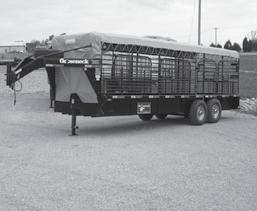
3 minute read
NCBA Legislative Updates
NCBA CONDEMNS COURT DECISION STRIKING DOWN NAVIGABLE WATERS PROTECTION RULE
WASHINGTON (August 31, 2021) — Yesterday, the U.S. District Court in Arizona struck down the 2020 Navigable Waters Protection Rule (NWPR), a regulation that corrected the disastrous 2015 Waters of the United States (WOTUS) rule and provided key protections to farmers and ranchers. “The Navigable Waters Protection Rule limited federal overreach and provided regulatory certainty to our nation’s cattle producers,” said NCBA Chief Environmental Counsel Scott Yager. “The NWPR was a solution to the far overreaching 2015 WOTUS rule but yesterday’s court decision adds further confusion to an issue that has been complicated by decades of activist-driven litigation. NCBA is disappointed in this decision and will continue advocating for regulations that protect the ability of cattle producers to invest in their land and care for their cattle.” The Biden Administration had previously announced its intent to repeal and replace the NWPR. While NCBA discouraged the repeal of NWPR, the Biden Administration pursued a deliberative, transparent outreach strategy, allowing for American cattle producers to have a voice in the process. Background Earlier this year, the Biden Administration announced their intent to repeal and replace the NWPR. The Administration planned a threephase process including listening sessions with the Environmental Protection Agency and Army Corps of Engineers, a repeal rule for NWPR, and a new WOTUS rule. The first public comment phase began in August and NCBA, state affiliates, and numerous cattle producers submitted comments to the Agencies. Last month, the U.S. District Court in South Carolina dismissed a similar case, which allowed the NWPR to remain in effect until a repeal rule was finalized by the Biden Administration. That decision ensured regulatory certainty for cattle producers while the Biden Administration moved through the rulemaking process. Yesterday’s court decision is the first time a federal court has vacated the NWPR.
NCBA SECURES EXTENSION OF CRITICAL EXEMPTION FOR LIVESTOCK HAULERS
WASHINGTON (August 31, 2021) — Today, the Federal Motor Carrier Safety Administration (FMCSA) announced an extension of the exemption from hours-of-service (HOS) requirements for livestock haulers. Livestock haulers continue to need this flexibility for the well-being of livestock during hauls, and to keep grocery stores stocked with beef during the continued disruption of COVID-19. This extension comes after consistent advocacy by the National Cattlemen's Beef Association (NCBA).
The National Cattlemen’s Beef Association (NCBA) has represented America’s cattle producers since 1898, preserving the heritage and strength of the industry through education and public policy. As the largest association of cattle producers, NCBA works to create new markets and increase demand for beef. Efforts are made possible through membership contributions. To join, contact NCBA at 1-866-BEEF-USA or membership@beef.org. Thanks in part to NCBA's continued push on this issue, livestock haulers have been operating under an HOS exemption since the beginning of the COVID-19 pandemic while maintaining a strong safety record. "We are grateful to FMCSA for the extension of this exemption, which will provide livestock haulers continued flexibilities under hours-of-service regulations. I believe FMCSA's continuation of this exemption indicates their confidence in our producers to keep doing their work safely and effectively, while keeping the grocery store shelves stocked with beef. NCBA will continue to work toward additional, more permanent flexibility under HOS, and we appreciate FMCSA's open dialogue on this issue," said NCBA Executive Director of Government Affairs Allison Rivera. The most recent extension will continue through midnight on November 30, 2021. Current HOS rules allow for 11 hours of drive time, 14 hours of on-duty time, and then require 10 consecutive hours of rest. When transporting livestock, there is a real need for further flexibility beyond the current hours-of-service. Unlike drivers moving consumer goods, livestock haulers cannot simply idle or unload their trucks when drive time hours run out without jeopardizing animal health and welfare.

Eby Aluminum Trailers
Gooseneck steel and aluminum trailers











